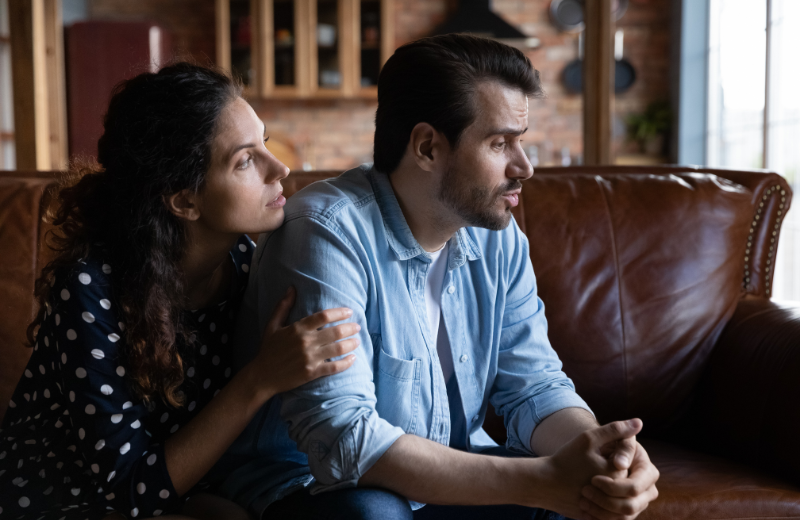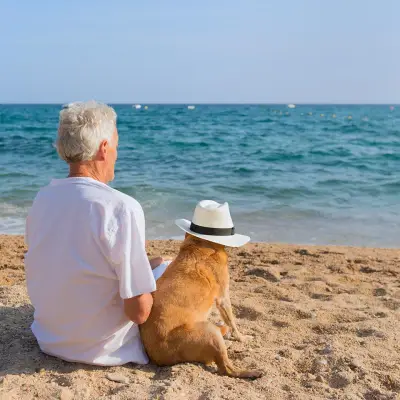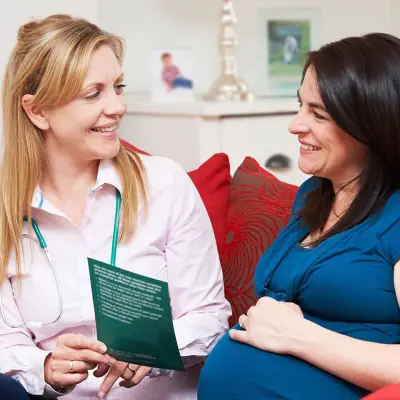Experiencing guilt after surviving a traumatic event, particularly when others did not, is more common than you might think. Whether it's a tragic accident, war, or natural disaster, those who survive often struggle with powerful feelings of guilt. This sensation, known as survivor’s guilt, can weigh heavily on a person’s mind and affect their emotional well-being. If you’re reading this, you may be trying to understand these feelings or help someone else through them. In this post, we’ll explore what survivor’s guilt is, its causes, symptoms, and how to seek treatment to move forward.
Jump To:
Recommended for you!
Best SellersWhat is Survivor’s Guilt?
Survivor’s guilt is the emotional distress experienced by those who have survived a traumatic event when others have not. Often, it’s characterised by feelings of self-blame, regret, and the constant question, “Why did I survive?” The definition of survivor's guilt can also extend to those who feel guilty for escaping a tragedy unharmed when others suffered.
Survivors Guilt Psychological Meaning and Definition
In psychological terms, survivor's guilt is a type of emotional response to trauma. It arises when a person feels responsible or regretful for having lived through an event where others may have been harmed or killed. It’s important to understand that this guilt, although intense, is irrational. Survivors often feel they could have done something differently to change the outcome, even when the event was completely beyond their control.
Why Do People Feel Guilty When a Loved One Dies?
When someone close passes away, it’s natural to feel grief. However, survivor’s guilt occurs when the person feels responsible for that death, even when they had no part in causing it. This misplaced sense of guilt can occur after accidents, illness, or natural causes.
Symptoms of Survivor’s Guilt

The symptoms of survivor’s guilt can vary from mild emotional discomfort to severe distress that affects daily functioning. You might recognise some of these in yourself or others:
- Emotional Symptoms: Overwhelming feelings of guilt, sadness, anxiety, or helplessness. Some may experience depression or a sense of worthlessness.
- Behavioural Symptoms: Avoidance of situations or people that remind you of the trauma, withdrawal from social connections, or excessive dwelling on the event.
- Cognitive Symptoms: A persistent feeling that you could have done something to prevent the tragedy, or wondering why you survived when others didn’t. These thoughts can lead to a distorted view of personal responsibility.
Causes of Survivor’s Guilt
Understanding the causes of survivor’s guilt can help make sense of why people experience it. It often stems from the deeply ingrained human instinct to protect others, combined with the unexpected nature of traumatic events.
A key cause of survivor’s guilt is the belief that you had some control over the outcome of the traumatic event. For example, in situations where someone dies, a survivor might think, "If only I had done this differently, they would still be alive." This line of thinking creates an emotional burden of perceived responsibility, even when rationally, the person understands they had no control.
Survivor’s guilt is also tied to moral values, which leads to the idea of moral injury. This occurs when a survivor feels they have violated their ethical beliefs by living when others didn’t, especially in the case of military combat or natural disasters.
Survivor’s Guilt and PTSD: What’s the Difference?

People often confuse survivor’s guilt with Post-Traumatic Stress Disorder (PTSD), as both involve responses to trauma. However, there are important distinctions between the two.
- Survivor’s Guilt: This involves feelings of guilt and remorse for surviving when others did not. It’s primarily focused on the emotional and moral dilemma of living after a traumatic event.
- PTSD: PTSD is a broader condition that affects those who have experienced trauma. It includes flashbacks, hypervigilance, nightmares, and other symptoms related to reliving the traumatic experience.
It’s possible for someone with survivor’s guilt to also develop PTSD, but they are not the same. Survivor’s guilt focuses on the emotional aftermath, while PTSD involves re-experiencing the trauma itself.
How Survivor’s Guilt Affects Relationships
Survivor’s guilt doesn’t just affect the individual—it can also have a significant impact on relationships. Loved ones may struggle to understand the depth of the survivor’s emotions, leading to frustration or miscommunication.
A person with survivor’s guilt may withdraw from family and friends, feeling as though they don’t deserve happiness or support. They might also struggle with intimacy or being emotionally available, as their feelings of guilt overshadow their relationships.
Understanding how survivor's guilt affects relationships can be the first step towards healing. It’s important to communicate openly with loved ones and seek support rather than trying to cope with these feelings alone.
Is Survivor’s Guilt Irrational?
Survivor’s guilt is often called irrational because it stems from a misunderstanding of responsibility. Traumatic events are usually outside of your control, yet survivors frequently feel that they should have been able to prevent them. The moral logic of survivor’s guilt makes sense emotionally, but not rationally. It’s the mind’s way of trying to find meaning or explanation in something senseless.
How to Get Rid of Survivor’s Guilt

If you’re wondering how to get rid of survivor’s guilt, the first step is acknowledging that the feelings are real, but not justified. Healing from survivor’s guilt often requires time, patience, and support.
- Therapy: Speaking with a therapist can help you process these emotions in a safe and constructive way. Cognitive behavioural therapy (CBT) is particularly effective in challenging the irrational thoughts that contribute to survivor’s guilt.
- Group Support: Connecting with others who have experienced similar situations can be incredibly healing. Sharing stories and realising you’re not alone can help ease the burden.
- Mindfulness and Meditation: Practising mindfulness can help you manage the emotional and physical symptoms of guilt by grounding you in the present moment, rather than reliving the past.
The best therapy for survivor’s guilt depends with each person, but a combination of emotional support and professional guidance is often key to recovery.
Does Survivor’s Guilt Ever Go Away?
Survivor’s guilt can lessen over time, but it doesn’t always disappear entirely. However, with the right support and treatment, many people find that they are able to manage their guilt and live fulfilling lives. The process of healing may include forgiving yourself, accepting that the event was beyond your control, and allowing yourself to move forward.
Recommended for you!
Best SellersStudy PTSD Awareness for £29
At Centre of Excellence, we offer a PTSD Awareness Diploma Course designed to help you gain a deeper understanding of trauma and its effects, including survivor’s guilt. For a limited time, you can access this course for the discounted price of £29!













